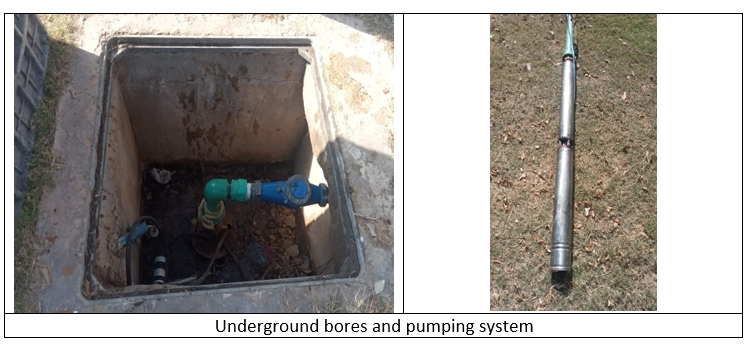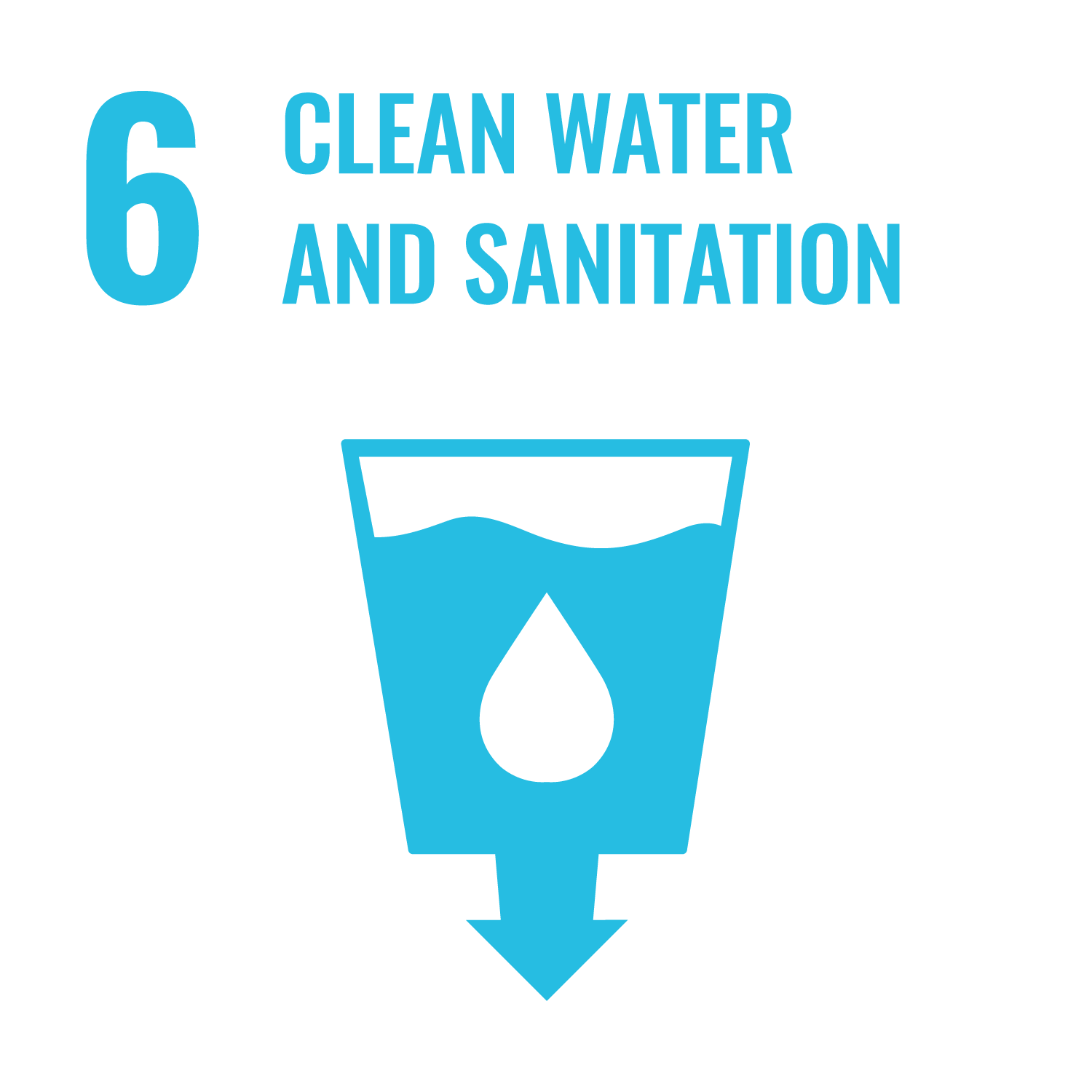 Goal 6. Clean Water and Sanitation
Goal 6. Clean Water and Sanitation
6.3.5 Water-conscious planting
AASTMT demonstrates a strong commitment to water conservation through comprehensive water management policies implemented across all campuses. Initiatives include reducing water usage for sprinkler irrigation, installing water-saving faucets, low-flush toilets, and advanced non-flushing urinals. New campus buildings adhere to green building principles, supporting water saving efforts. Additional measures, such as minimizing water consumption for vehicle washing, further reflect AASTMT's sustainable approach. The AASTMT maximizes the use of public spaces by cultivating agriculture, including flower beds, trees, shrubs, and indigenous plants, using an automated irrigation system and a water spraying system for fields. At the Abu-Qir Campus, groundwater from 13 borehole wells is utilized for both irrigation and drinking water, undergoing regular monitoring and treatment to maintain water quality. For agricultural purposes, AASTMT employs drip irrigation with perforated pipe networks in landscaped areas, replacing high-water-consuming flood irrigation that relies on potable water. This approach significantly enhances water productivity and supports sustainable irrigation management.
Sustainable Water Framework Integrating Irrigation, Treatment, and Resource Rehabilitation
AASTMT demonstrates its dedication to sustainable water management through the implementation of an advanced irrigation system designed for water-conscious planting and responsible resource utilization. AASTMT buildings have an integrated water distribution network featuring drip irrigation, pressure-compensating bubblers, solenoid valves, and automated controllers that collectively enhance water productivity and reduce pollution and groundwater contamination. Through proper trenching, drainage, and sealed piping systems, the design ensures safe soil–groundwater interaction and supports the long-term rehabilitation of water resources. The irrigation system includes the following:
1. Efficient Water Distribution: Through the use of drip tubing layouts, bubblers on stakes, and pressure-compensating bubblers that minimize evaporation, runoff, and water loss. These precision-irrigation systems deliver potable-quality water directly to the root zone, optimizing consumption and prevents non-point source pollution and safeguards groundwater quality.
2. Automated and Controlled Watering: The inclusion of a controller unit, solenoid valves, and irrigation control wiring demonstrates a semi-smart irrigation management process that automates watering schedules. This system ensures that irrigation occurs only when necessary, reducing wastewater generation, improving water allocation, and supporting sustainable resource management.
3. Proper Design and Infrastructure: The irrigation system includes mainline and lateral trenching, valve boxes, and positive drainage systems, prevents leakage, erosion, and soil saturation. The system also includes electrical grounding for operational safety, ensuring long-term reliability and minimizing risks of polluted water infiltration into groundwater systems.
4. Maintenance and Reuse Readiness: The inclusion of flush valves and quick-coupling valves promotes system maintenance, reuse, and wastewater control. These components allow for periodic cleaning, backwashing, and integration with treated effluents or constructed wetlands, reinforcing resource rehabilitation and pollution removal. The design also accommodates potential linkage to desalination units and rainwater harvesting systems thus ensuring future readiness for integrated water reuse and management frameworks.

Use of Recycled Water for planting:
- Utilizing irrigation techniques with perforated pipe networks in planting beds during site modifications around projects, instead of water-intensive flood irrigation that consumes large amounts of potable water.
- Controlling the flow of rainwater in paved areas by installing drainage inlets connected to a deep, perforated pipe network, directing rainwater into the soil to recharge the natural groundwater reservoir and reduce the load on drainage systems.
- Employing open drainage on rooftops and walkways to channel rainwater into planting beds and green areas, thereby easing the burden on the sewage networks.
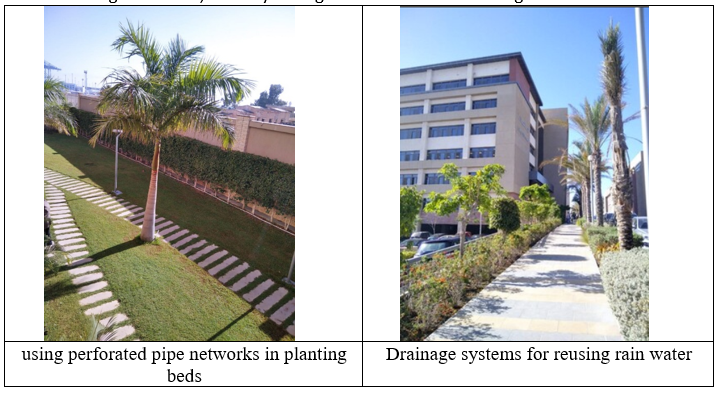
Sustainable Water Management through Non-Potable Resources
The irrigation system at the Academy's Alamein branch has been implemented by connecting a non-potable water network through the New Alamein City Authority, which is linked to a dedicated water tank for the irrigation network. Irrigation water is pumped to the main site through a central pumping system consisting of six pumps.
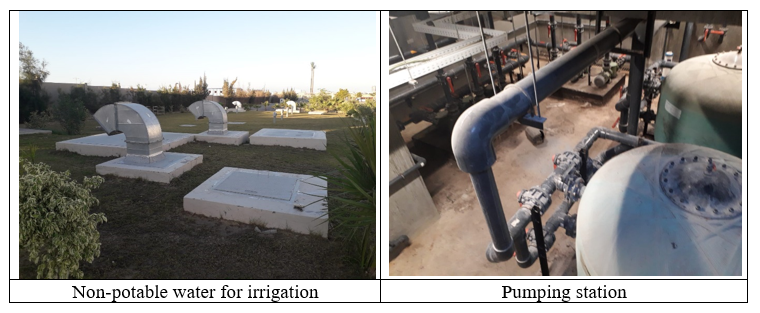
Aquaponic Food production:
AAST employs an aquaponic system for food production that minimizes freshwater usage, relying on innovative soil types and organic fertilizers. This sustainable method reduces freshwater requirements by 90% compared to traditional agricultural techniques, while achieving a threefold increase in crop yield over conventional land farming. Various crops, including tomatoes, cucumbers, and cereals like rice and maize, have been successfully cultivated with this approach at the AAST Aquaculture Research Center.
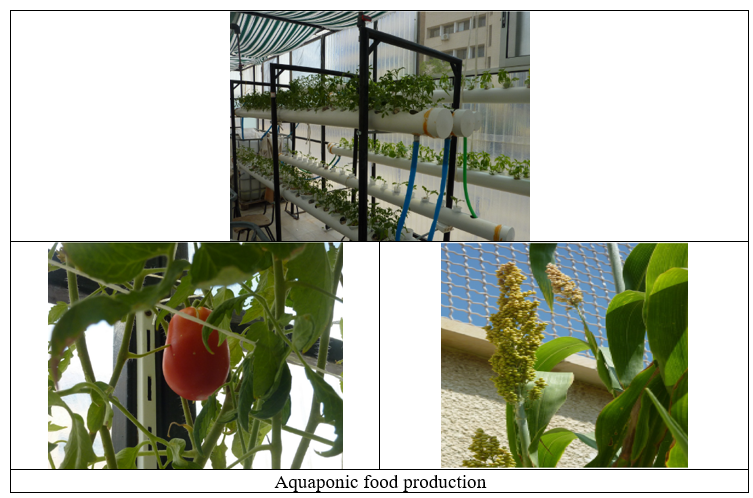
Composting the organic waste into an organic fertilizer using the earthworm Eisenia fetida (red wiggler)
Recycling organic waste poses a significant challenge globally, particularly in Arab countries facing rapid population growth and development. Most organic waste ends up in landfills, with a small portion buried in specially designed underground facilities. The decomposition of this waste generates greenhouse gases, including CO₂ and methane, and poses risks to groundwater quality. The AAST Aquaculture Research Center successfully engaged into a project that aims to establish a sustainable composting unit that utilizes earthworms to break down organic waste. The worms digest the waste, producing a nutrient-rich byproduct called vermicompost, which is packed with organic nutrients and growth hormones beneficial for plant growth. Additionally, earthworms have a high reproduction rate, and their protein content can reach up to 70%, making dried worm meal a valuable supplement for fish and poultry feed. This can reduce the cost of fish and poultry production, thereby lowering prices for these essential food sources as well as transforming waste into a valuable product while reducing greenhouse gas emissions. Details of the project can be found at:
https://aast.edu/en/scientific-research/projects/project.php?uid=16&proj_id=2716
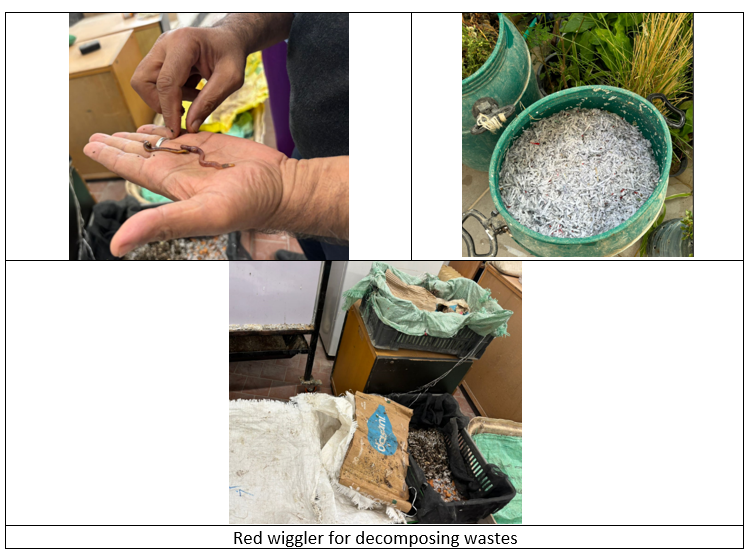
Hydronic System Integration and Water Reuse:
At the Aquaculture Research Center, hydroponic systems are used for over 12 years now to reduce water consumption by 90%, thus significantly enhancing water-use efficiency in food production. The developed hydroponic system is based on the technique of “Ebb and Flow” using gravel as the support medium. The main nutrient solution is “vermi-compost tea”. The system uses no chemical fertilizers or any pesticides to control insects and instead uses natural products made from Neem Oil or garlic solution for controlling insects. These innovations contribute to sustainable resource management, reducing water use while promoting organic food production.
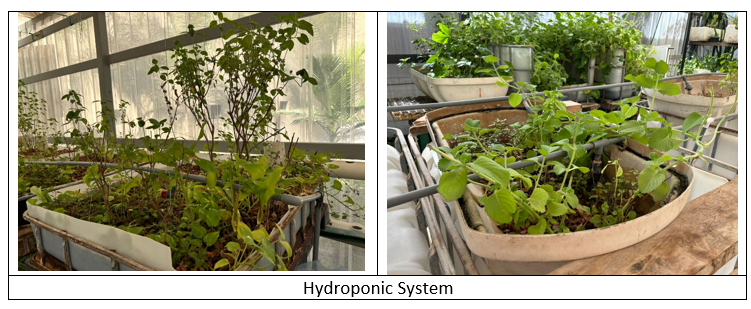
Use of drought- tolerant planting for landscapes
The use of drought-resistant plants to minimize irrigation needs and absorb rainwater, helping to mitigate the impact of heavy rainfall in New Alamain and Abukir campus. Water-saving plots are used, which will reduce water consumption by about 30%. Planting castor plants, cactus and Jatrophaplant from greywater produced from the building of Maritime Transport building in AbuKir campus
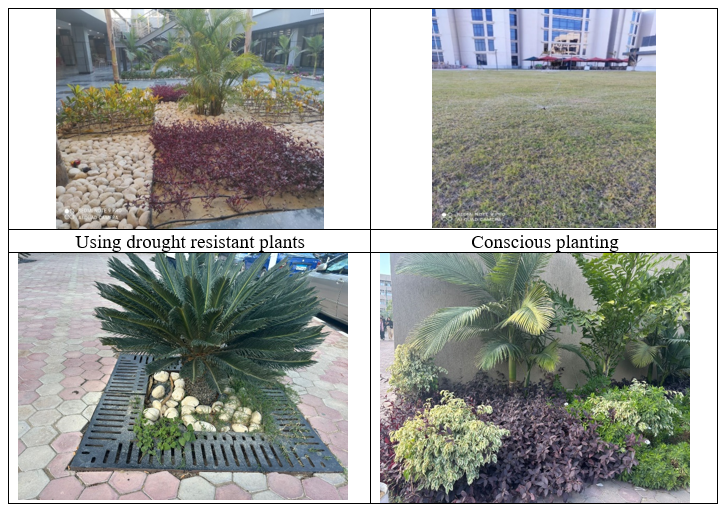
Groundwater for Irrigation
The AASTMT utilizes a sustainable approach to support its agricultural irrigation needs through groundwater wells. There are 13 wells, each with a depth of 15 meters, equipped with a submersible water pump with a capacity of 3 horsepower. Each well serves an area of 8,000 square meters, helping to significantly reduce the reliance on other water sources. To monitor usage, each well is fitted with a water meter that tracks the amount of water extracted monthly. On average, the total water consumption from these wells reaches 10,000 cubic meters per month.
Monitoring, Assessment and Innovative Treatment Technology to Enhance Groundwater Quality for Irrigation toward Climate Change Adaptation on AASTMT webpage
